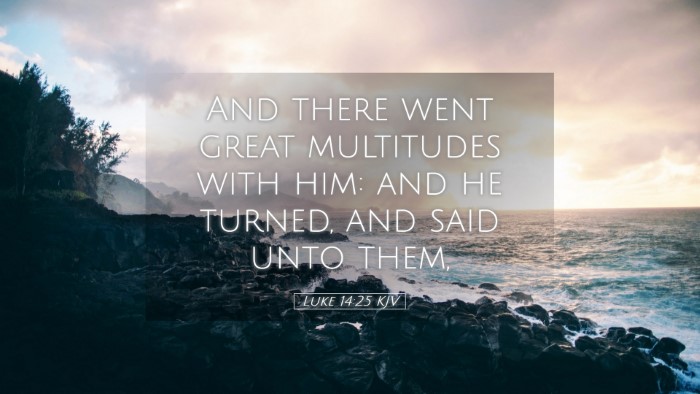Commentary on Luke 14:25
Verse: Luke 14:25 (KJV) "And there went great multitudes with him: and he turned, and said unto them,
This verse introduces a pivotal moment in the ministry of Jesus where He addresses a large crowd that was following Him. It immediately sets the stage for one of His most challenging teachings about discipleship and the cost associated with following Him.
Contextual Background
The setting of Luke 14 is crucial for understanding Jesus' message. He is on His way to Jerusalem, and His ministry is becoming increasingly directed toward serious discipleship. The large crowds are indicative of His popularity; however, this popularity often drew individuals interested in the benefits of following Him rather than a true commitment to His teachings.
Public Domain Commentary Insights
Matthew Henry's Commentary
Matthew Henry notes that the allure of Jesus' miracles and teachings attracted many, but it is essential to understand that following Christ requires more than mere enthusiasm. Henry emphasizes that Jesus speaks to the multitude to help them recognize the cost of discipleship, indicating that not all who start the journey are willing to finish it.
Albert Barnes' Notes
Albert Barnes elaborates on the significance of the term "great multitudes." He points out that while many followed Jesus for the fame and performative aspects of His ministry, genuine discipleship entails a personal sacrifice. Barnes stresses that Jesus makes it clear that to be His disciple, one must prioritize their commitment to Him above all worldly relationships.
Adam Clarke's Commentary
Adam Clarke provides deeper insight into the societal implications of this verse. He highlights the cultural context in which Jesus made these statements and suggests that the crowd's understanding of discipleship would have included complete loyalty to the Rabbi. Clarke advocates that Jesus' call to follow Him involves a radical realignment of affections and priorities.
The Cost of Discipleship
As the verse unfolds into subsequent teachings, it becomes evident that Jesus is preparing His followers for an honest evaluation of their commitment. The teachings in the rest of the chapter emphasize the requirements of self-denial, sacrificial living, and a fresh perspective on familial relationships.
Key Themes to Consider
- Prioritization of Christ: Jesus' call demands that He be placed above all other relationships, contrasting the social norms of His day.
- Suffering and Sacrifice: Following Jesus often leads to personal trials, illustrating that the journey of faith is intertwined with suffering.
- Self-reflection: Congregants are invited to evaluate the sincerity of their followership and what it truly means to live as disciples of Christ.
Theological Implications
This verse raises significant theological questions that resonate with both ancient and contemporary audiences. What does it mean to be called a disciple? How does one reconcile familial duties with spiritual commitments? These inquiries stretch beyond cultural contexts and reveal insights into personal faith journeys and communal church life.
Practical Applications for Ministry
This passage should challenge pastors and church leaders to present the gospel with clarity about the implications of discipleship. It is not enough to attract crowds; true ministry lies in fostering committed relationships with Christ.
Suggestions for Pastoral Reflection
- Disciple Development: Design programs that help believers understand the weight of their commitment and guide them through their journey of faith.
- Community Involvement: Encourage the church community to support one another through trials and tribulations that come with following Christ.
- Teaching about Cost: Regularly include teachings on the cost of discipleship in sermons and Bible studies to sensitize the congregation to spiritual priorities.
Conclusion
Luke 14:25 serves as a bold declaration of the expectations of Jesus concerning discipleship. Drawing from insights from public domain commentaries, we see that this teaching transcends historical and cultural barriers, continuing to challenge and inspire current and future generations of believers to embrace a faith that willingly bears the cost involved. As we lead our congregations, may we emphasize the beauty that comes from a life wholly surrendered to Christ, despite the personal sacrifices it may entail.


